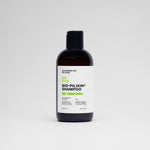Sulfates, particularly sodium lauryl sulfate (SLS) and sodium laureth sulfate (SLES), have been commonly used in shampoos and other personal care products for their effective cleansing and foaming properties. However, with growing concerns about their potential to cause skin irritation, dryness, and hair damage, many consumers are seeking sulfate-free alternatives. If you're unsure whether your shampoo contains these controversial ingredients, there are a few ways to determine if it's sulfate-free or not.
Table of content
How do I know if my shampoo has sulfates?
The most reliable way to determine if your shampoo contains sulfates is to carefully read the ingredient list on the product label. Sulfates are often listed under their chemical names, such as sodium lauryl sulfate (SLS) or sodium laureth sulfate (SLES). If you see either of these ingredients or any variations (e.g., ammonium lauryl sulfate, ammonium laureth sulfate) listed, then your shampoo contains sulfates.
Check the Label Claims
Many shampoo brands prominently display "sulfate-free" or "no sulfates" claims on their product packaging or labels. While these claims can be helpful indicators, it's still essential to cross-check the ingredient list to ensure the shampoo is truly free of sulfates. Some brands may use alternative sulfate-based surfactants that are not explicitly labeled as "sulfates."
Look for Natural or Organic Certifications
Shampoos that are certified as organic or natural by reputable organizations, such as the USDA Organic, COSMOS, or EcoCert, are typically free from sulfates and other synthetic ingredients. However, it's still a good practice to review the ingredient list to confirm the absence of sulfates.
As your leading source for hair health information over the past 4 years, we never compromise on accuracy. When it comes to your health, you deserve information you can truly rely on - and earning your trust is our top priority.
Here's how Scandinavian Biolabs ensures every piece of content meets the highest standards of accuracy and integrity:
- Credentialed Experts: Our reviewers are actively practicing doctors and medical researchers
- Stringent Reviews: Content undergoes rigorous editing by subject specialists and review by a practicing doctor.
- Evidence-Based: We rely on well-established research from trusted scientific sources like peer-reviewed journals and health authorities.
- Full Transparency: Our editorial standards, writer credentials, reviewer credentials, correction process, and funding are all publicly documented.
- Independent Voice: While we do promote products, we operate in a vacuum to business operations. Our main goal is just an unwavering commitment to providing medically-sound guidance.
You can count on Scandinavian Biolabs to consistently deliver the trustworthy health information you deserve. Read our Editorial Standards.
Understanding Sulfate Alternatives
If your shampoo doesn't contain sulfates, it likely uses alternative surfactants or cleansing agents to create a lather and effectively cleanse the hair and scalp. Some common sulfate alternatives found in shampoos include:
- Glucosides: Derived from natural sources like coconut oil or fruits, glucosides are mild, plant-based surfactants that create a gentle lather.
- Betaines: These amphoteric surfactants, such as cocamidopropyl betaine, are derived from natural sources and are known for their mild cleansing properties.
- Amino Acid Surfactants: These surfactants, like sodium cocoyl glycinate, are derived from amino acids and are gentle on the hair and skin.
- Sugar-based Surfactants: Ingredients like decyl glucoside and lauryl glucoside are derived from plant-based sugars and offer a milder alternative to sulfates.
Potential Benefits of Sulfate-Free Shampoos
While the safety of sulfates in shampoos is still debated, many individuals opt for sulfate-free alternatives due to perceived benefits, such as:
- Reduced Irritation: Sulfates can potentially cause scalp irritation, dryness, and itching, especially for those with sensitive skin or conditions like eczema or psoriasis. Sulfate-free shampoos may be gentler and less irritating.
- Improved Hair Manageability: Some claim that sulfate-free shampoos help preserve the hair's natural oils, resulting in smoother, more manageable locks that are less prone to frizz and dryness.
- Prolonged Color Vibrancy: For those with color-treated hair, sulfate-free shampoos are often recommended as they are less likely to strip away hair color, helping to maintain vibrancy for longer.
- Environmental Considerations: Some sulfate-free shampoos use more environmentally friendly, plant-based ingredients, which may appeal to eco-conscious consumers.
Making an Informed Choice
Ultimately, the decision to use a sulfate-free or sulfate-containing shampoo comes down to personal preference and individual needs. If you have concerns about potential irritation or dryness, or if you simply prefer to avoid sulfates, opting for a sulfate-free shampoo may be the right choice for you.
However, it's important to note that sulfates are widely used and considered safe for most individuals when used as directed and rinsed off properly. If you're unsure about whether a sulfate-free shampoo is right for you, it's always a good idea to consult with a dermatologist or healthcare professional, especially if you have any underlying skin or scalp conditions.
By carefully reading ingredient lists and understanding the potential benefits and drawbacks of sulfate-containing and sulfate-free shampoos, you can make an informed decision that aligns with your personal preferences and hair care needs.
Ditch the Dryness!
Is your hair feeling dull, frizzy, or easily breaking? Harsh sulfates in your shampoo could be the culprit.
Scandinavian Biolabs Hair Strength Shampoo is a gentle, sulfate-free formula that cleanses without stripping your hair's natural oils. Made with nature-inspired ingredients, it helps:
- Reduce breakage for stronger, healthier hair
- Soothe your scalp and eliminate irritation
- Protect color-treated hair from fading
Experience the Scandinavian Biolabs difference!
Read more:






